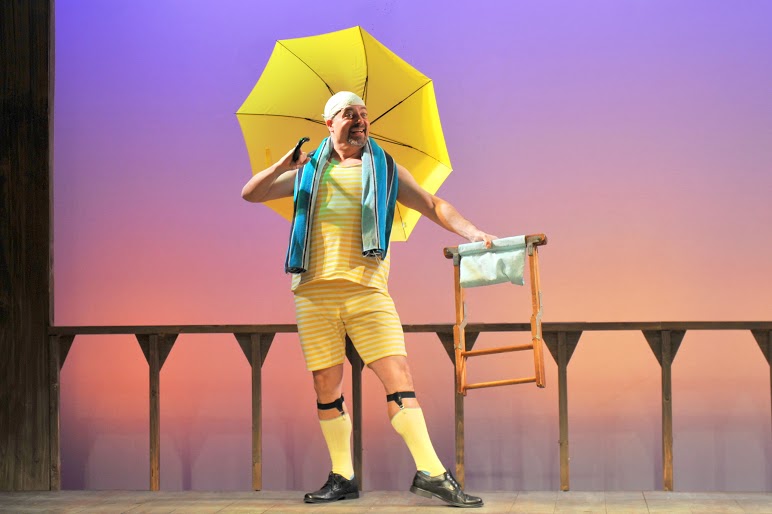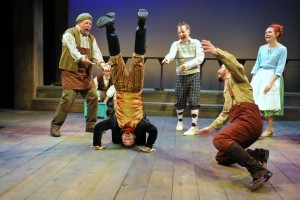
This week marks the 400th anniversary of William Shakespeare’s death. If there is ever a need to challenge the outdated argument that Shakespeare has no importance in modern times, direct the unenlightened to TWELFTH NIGHT at The Philadelphia Shakespeare Theatre, and proclaim, What you will! For, through all the cross dressing zaniness, drunken proclivities, and foolish wisdoms, this play displays Shakespeare’s insight into emotion through the universal theme of the misdirection of love, of love’s labour’s lost and won.
Carmen Khan thoughtfully directs this high comedy, unifying marvelously silly comedy with spot on observations about the complexities of humanity. The story is well known. Twin brother and sister crash their boat on the shores of Illyria, neither knowing the other has survived. Viola (Julia Jensen Ray) makes the decision that the best approach to making her way in this new land is to dress up as a man and become the servant of Duke Orsino (Deaon Griffin-Pressley). Naturally. Orsino is madly in love with Olivia (Elise Hudson), who is mourning the death of her own brother and has abjured the company of suitors. Having his overtures turned away and exhausted of servants to woo for him, Orsino sends Viola, now named Cesario, to win Olivia’s heart.
You see where this is going? Woman falls for man, who is actually a woman, while the wooer, a woman, has quickly fallen for her employer, who thinks she is a man. Hilarity ensues. Just wait until Sebastian, (Josh Kachnycz), Viola’s near identical sibling, returns, and meets Olivia. We now see a long built-up romance and a love at first sight dynamic play out simultaneously. Madness.
Be it in the sadistic laugh of Olivia’s maid Maria (Jenna Kuerzi), the golf-socks-wearing, drunken Don Knotts take on Sir Andrew Aguecheek by John Zak, or his interaction with Sir Toby Belch (William LeDent), who seeks every opportunity to catch even a sip of drink, this is comedy choreographed like a ballet. The jester Feste (Adam Kampouris) provides musicality and athletic skill, complete with head stands and scissor kicks. It’s a thoroughly charismatic and engaging performance.

Within the silliness, there is a theme of the tragic delusion behind the desire for love. Characters fall for those who do not share their feelings. This is seen most clearly in Malvolio, Olivia’s butler, hilariously and equally passionately played by Rob Kahn. Malvolio is tricked into believing Olivia has deep affections for him, and he goes from being a condescending man to a smiling cross gartered fool eventually taken to an asylum. He has some of the biggest laughs and the furthest heartbreak, as his affections go without reciprocation.
Displayed in Malvolio, we see the driving force of this play, in which many of the characters spend their considerable efforts, pursuing a love interest who either feels indifferently towards them or wholly loves another. We watch a series of one-sided love stories, in which the true natures and in some cases the true persons involved in the affairs, are not revealed until the very end of the play. It suggests how our own feelings and desires can drive us to such fanciful actions, based solely on the presupposition that the object of our affection feels the same.
It is a devoted delusion, a hope of reciprocated love that, in many cases, only exists within our own foolish skulls. Love makes us see what we want to see. “Nothing that is so is so” (Act IV, Scene I). The contemplations and the humors of this play are showcased in this enjoyable production.
[Philadelphia Shakespeare Theatre, 2111 Sansom Street] April 14–May 22, 2016; phillyshakespeare.org.
Twelfth Night plays in repertoire with Macbeth
